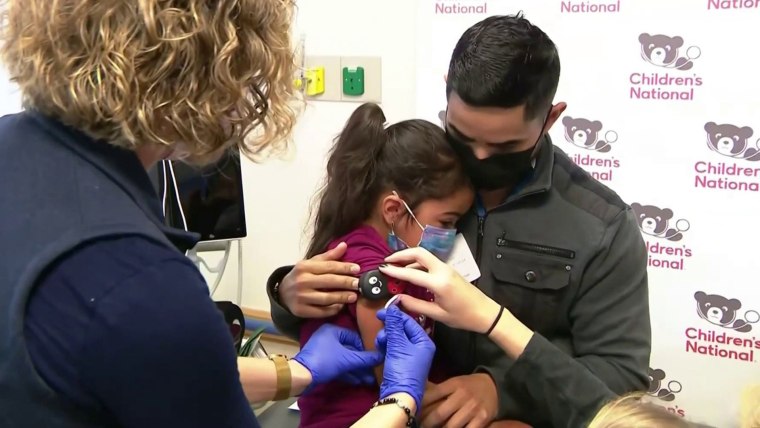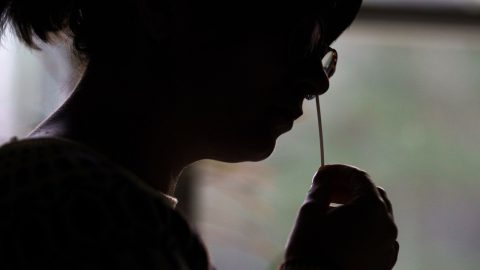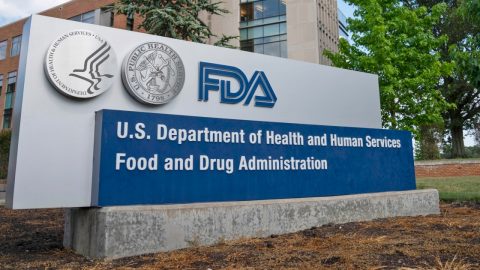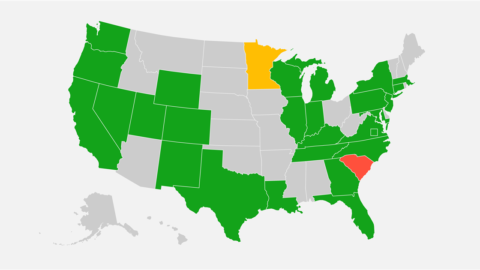Two doses of either the Pfizer-BioNTech or the Moderna Covid-19 vaccines provide minimal protection against symptomatic illness caused by the omicron variant of the coronavirus, but a booster shot was able to restore protection, new research finds.
The study, published Wednesday in the New England Journal of Medicine, found that the Pfizer vaccine’s effectiveness against symptomatic disease plummeted to about 8 percent from about 65 percent six months after the second dose of a primary vaccination series.
Full coverage of the Covid-19 pandemic
The effectiveness of the first two doses of the Moderna vaccine was similarly reduced, falling to about 15 percent from about 71 percent over the same period.
A booster shot of either the Pfizer or the Moderna vaccines increased the protection back to levels seen after two doses, before it starts to wane again after about two months, according to the researchers.
The study, funded by the U.K. Health Security Agency, adds to growing evidence that two doses of the existing Covid vaccines appear to offer little protection against mild illness from the omicron variant, although experts note that the shots still provide strong protection against severe disease and death.
The findings underscore the importance of the booster shot, the authors wrote, adding that third doses provide a “rapid and substantial” increase in protection against both mild and severe illness.
In the U.S., just under 50 percent of those eligible for boosters have had them, according to data from the Centers for Disease Control and Prevention.
The research confirms that the omicron variant “is significantly more likely to cause symptomatic breakthrough infections compared to delta,” said John Moore, a professor of microbiology and immunology at Weill Cornell Medical College, who wasn’t involved in the study.
But what’s more important, he added, is that protection against hospitalization and death is much more strongly preserved.
And those who have had three doses “still have pretty substantial protection” against symptomatic illness, Moore said.
The study, which was conducted from Nov. 27 to Jan. 12, when the omicron variant began circulating widely in the United Kingdom, looked at more than 1 million people infected with either the omicron or the delta variants. It looked only at whether people developed mild illness, not at severe outcomes, such as hospitalizations.
People were vaccinated and boosted with vaccines from Pfizer, Moderna or AstraZeneca.
People who received two doses of the AstraZeneca vaccine, which isn’t authorized for use in the U.S., also had waning protection against infection after several months, as well as after they received boosters, according to the study.
Other studies have also found that the vaccines may be inadequate to prevent omicron infections, although people who have had three doses appear to have the highest protection. In addition, studies show, two doses of a vaccine should still provide high protection against severe illness, hospitalization and death.
Download the NBC News app for full coverage of the Covid-19 pandemic
A separate study, published Tuesday by the CDC, found that while two doses of the Pfizer vaccine didn’t protect children 5 and older as well from omicron infections, the shots did keep most of them out of the hospital.
Dr. Paul Offit, a vaccine expert at Children’s Hospital of Philadelphia, said that going forward, people may have to accept that immunity provided by a previous infection or vaccination may not be very good at protecting against mild illness.
“We have labeled this virus as one in which there is zero tolerance for spread and zero tolerance for asymptomatic or mildly symptomatic infection,” said Offit, who wasn’t involved with the new research. “Until we can accept the fact that people are going to be walking around mildly symptomatic, even though they’ve been vaccinated, we are not going to move into an endemic stage.”
Follow NBC HEALTH on Twitter & Facebook.









Recent Comments